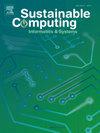Sustainable energy harvesting techniques for underwater aquatic systems with multi-source and low-energy solutions
IF 5.7
3区 计算机科学
Q1 COMPUTER SCIENCE, HARDWARE & ARCHITECTURE
引用次数: 0
Abstract
Underwater Internet of Things (IoT) systems are essential for monitoring and conserving aquatic ecosystems. These systems are deployed with limited energy resources, harsh environmental conditions and high energy consumption during communication. Standalone solar or wave-based energy harvesting techniques are insufficient because of ecological conditions and variable energy availability. In addition, conventional communication protocols are power-hungry and limit the operation time of underwater nodes. This work introduces a strong, energy-efficient combination of Multi-Source Energy Harvesting Systems and Low-Energy Communication Protocols. The proposed approach will ensure constant energy flow irrespective of the submarine's changing environment by intermixing wave energy with thermal energy, microbial fuel cells, and backup solar systems. The supplementary alternative energy sources avoid the need for batteries, which could result in sustainable operations. Additionally, incorporating low-power communication techniques such as Frequency Shift Keying (FSK) and sleep-wake scheduling significantly reduces energy consumption during data transmission. It is the most power-intensive operation in IoT networks. The proposed work addresses gaps in existing energy harvesting and communication frameworks by optimizing energy generation and consumption. This dual approach enhances the sustainability of underwater IoT systems and improves reliability in diverse and unpredictable aquatic environments. The proposed low-energy communication protocol achieves a transmission success rate of 98.5 %, energy harvesting efficiency of 90 %, and a battery lifetime of over 72 h, optimized for underwater environments.
具有多源和低能量解决方案的水下水生系统的可持续能量收集技术
水下物联网(IoT)系统对于监测和保护水生生态系统至关重要。这些系统部署在有限的能源资源,恶劣的环境条件和通信过程中的高能耗。独立的太阳能或基于波浪的能量收集技术是不够的,因为生态条件和可变的能源可用性。此外,传统的通信协议非常耗电,并且限制了水下节点的操作时间。这项工作介绍了一个强大的、节能的多源能量收集系统和低能量通信协议的组合。所提出的方法将通过将波浪能与热能、微生物燃料电池和备用太阳能系统混合在一起,确保恒定的能量流,而不受潜艇环境变化的影响。补充替代能源避免了对电池的需求,这可能导致可持续的操作。此外,结合低功耗通信技术,如频移键控(FSK)和睡眠-觉醒调度显著降低了数据传输过程中的能量消耗。这是物联网网络中最耗电的操作。拟议的工作通过优化能源生产和消费来解决现有能源收集和通信框架中的差距。这种双重方法增强了水下物联网系统的可持续性,并提高了在多样化和不可预测的水生环境中的可靠性。所提出的低能量通信协议的传输成功率为98.5 %,能量收集效率为90 %,电池寿命超过72 h,并针对水下环境进行了优化。
本文章由计算机程序翻译,如有差异,请以英文原文为准。
求助全文
约1分钟内获得全文
求助全文
来源期刊

Sustainable Computing-Informatics & Systems
COMPUTER SCIENCE, HARDWARE & ARCHITECTUREC-COMPUTER SCIENCE, INFORMATION SYSTEMS
CiteScore
10.70
自引率
4.40%
发文量
142
期刊介绍:
Sustainable computing is a rapidly expanding research area spanning the fields of computer science and engineering, electrical engineering as well as other engineering disciplines. The aim of Sustainable Computing: Informatics and Systems (SUSCOM) is to publish the myriad research findings related to energy-aware and thermal-aware management of computing resource. Equally important is a spectrum of related research issues such as applications of computing that can have ecological and societal impacts. SUSCOM publishes original and timely research papers and survey articles in current areas of power, energy, temperature, and environment related research areas of current importance to readers. SUSCOM has an editorial board comprising prominent researchers from around the world and selects competitively evaluated peer-reviewed papers.
 求助内容:
求助内容: 应助结果提醒方式:
应助结果提醒方式:


